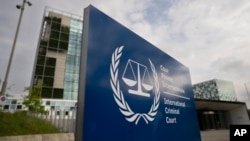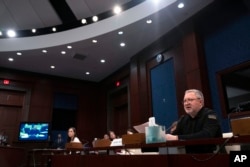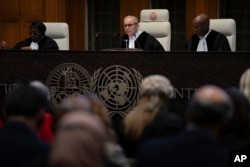The Biden administration denounced an International Criminal Court announcement this week that it is pursuing arrest warrants for Israeli and Hamas leaders over alleged war crimes during Israel's military campaign in Gaza and the militant group's October 7 attack on Israel.
"We made our position clear on the ICC," President Joe Biden said Thursday. "We don't recognize their jurisdiction, the way it's been exercised, and it's that simple. We don't think there's an equivalence between what Israel did and what Hamas did."
International law experts say that the relationship between the U.S. and ICC has never been simple.
The ICC was established in 1998 by the Rome Statute and tasked with prosecuting individuals responsible for war crimes, crimes against humanity and genocide. It was signed by the U.S. in December 2000, by U.S. lead negotiator David Scheffer.
The U.S., fearing that Americans would be vulnerable to prosecution abroad, never ratified the treaty.
More than 120 countries have ratified it, making them member states.
The ICC has jurisdiction over atrocity crimes committed by citizens of member states, or committed in member states, or in nonmember states that grant it jurisdiction. It also has jurisdiction over crimes committed in nonmember states that are referred to it by the U.N. Security Council.
The U.S. maintains that the ICC has no jurisdiction over citizens of non-ICC states. Israel is not an ICC member; therefore, the Biden administration said, the court has no right to issue arrest warrants for Israeli Prime Minister Benjamin Netanyahu and Defense Minister Yoav Gallant.
Stephen Rademaker, former chief counsel of the House Committee on Foreign Affairs and assistant secretary of state in the George W. Bush administration, agrees.
"The fundamental principle undergirding all treaty-based international law is the principle of consent," he told VOA.
Under the U.S. argument, which Scheffer calls the "immunity interpretation," the same standards should apply to all non-ICC states.
However, various U.S. administrations have supported some ICC investigations.
The George W. Bush administration supported the ICC's 2002 investigations into allegations of atrocities committed in the Darfur region of Sudan. The Obama administration supported the ICC's case in Libya in 2011, which accused the government of Moammar Gadhafi of war crimes and crimes against humanity.
Sudan and Libya were non-ICC states, but under the Rome Statute, the U.N. Security Council had the authority to refer those cases to the ICC for investigation, Rademaker said.
The ICC began its investigations of Russian officials for alleged atrocities in Ukraine in 2023, and of Israeli officials and Hamas leaders this month. Russia and Israel are non-ICC states, and neither investigation was authorized by the U.N. Security Council, Rademaker said.
"So the U.N. Charter cannot be cited as a basis of consent by them to action by the ICC," he said.
However, while it rejected the ICC's case against Israeli officials, the Biden administration supported the ICC's investigations of Russian suspects. Biden has used the word "genocide" to describe Russian atrocities in Ukraine and has described Russian President Vladimir Putin as a war criminal who should be put on trial.
When asked to explain the distinction, White House national security spokesman John Kirby said that Putin's war aim was "to kill innocent Ukrainian people."
"He's deliberately targeting civilian infrastructure with the aim of killing innocent civilians, and it's just baked into his operational strategy," Kirby told reporters Monday. "As we have said before, that is not what the IDF [Israel Defense Forces] is doing."
Hypocrisy alleged
Critics say this difference in the Biden administration's posture amounts to hypocrisy.
"There is an obvious inconsistency," said Adil Haque, a law professor at Rutgers University who writes on international law and the ethics of armed combat.
"It is hard to get around," he told VOA. "And it's easier to see when you contrast it with European countries which are allies of Israel but also parties to the ICC statute," he said, referring to Germany, which said it would execute the arrest warrant on German soil despite disagreeing with the decision.
While the contradiction is apparent under the Biden administration, selective U.S. engagement with the ICC began decades ago.
In 2002, George W. Bush signed into law the American Servicemembers' Protection Act, which authorizes the U.S. president to use "all means necessary and appropriate to bring about the release of any U.S. or allied personnel being detained or imprisoned by, on behalf of, or at the request of the International Criminal Court."
The Obama administration rejected the ICC's preliminary examinations of the war in Afghanistan, including into alleged atrocity crimes committed by the Taliban, Islamic State group and U.S. coalition forces. It also opposed the court as it began pursuing war crimes charges against Israeli officials.
While the Bush and Obama administrations would apply a case-by-case approach to the ICC, under the Trump administration, U.S. "hostility hit its apex," said Kip Hale, an attorney specializing in atrocity crimes accountability. He said ICC investigations into Afghanistan and “Israel-Palestine” prompted the Trump administration to level sanctions against then-ICC prosecutor Fatou Bensouda and one of her senior staff and to threaten other ICC staff and their families with visa bans and other punitive actions.
In the case of investigating Russian atrocities in Ukraine, the Biden administration changed provisions under the American Servicemembers' Protection Act and the Foreign Relations Authorization Act of 2001 to allow for information sharing, funding and other types of support for the ICC, Hale told VOA.
"Unfortunately, the criteria is who are your allies and who are your rivals," he said, adding that geopolitical expediency often dictates the behavior of all states, not just the U.S.
ICC judges are now reviewing evidence presented by ICC prosecutor Karim Khan, who made the decision to pursue arrest warrants with the advice of a panel of international legal experts that included prominent human rights lawyer Amal Clooney.
"We unanimously conclude that there are reasonable grounds to believe that Hamas leaders Yahya Sinwar, Mohammed Deif and Ismail Haniyeh have committed war crimes and crimes against humanity, including hostage-taking, murder and crimes of sexual violence," Clooney said in a statement.
"We unanimously conclude that there are reasonable grounds to believe that Israeli Prime Minister Benjamin Netanyahu and Israeli Defense Minister Yoav Gallant have committed war crimes and crimes against humanity including starvation as a method of warfare, murder, persecution and extermination."
Netanyahu called the ICC's move against him and his defense minister absurd and said that he rejected "with disgust" the comparison between Israel and Hamas.
ICJ decision on Rafah
On Friday, the United Nations' top court, the International Court of Justice (ICJ), ordered Israel to immediately halt its military offensive in the southern Gaza city of Rafah, as part of proceedings against Israel brought by South Africa in December.
Israel doesn't accept the ICJ's jurisdiction and is unlikely to comply with the order. It maintains that its military campaign is a "defensive and just war" to eliminate Hamas and to secure the release of hostages and that it is "consistent with its moral values and in compliance with international law."
The ICJ was established by the U.N. Charter to settle disputes between states and advise the U.N. on legal matters. It does not have jurisdiction to try individuals.
While the ICJ's legal jurisdiction is separate from that of the ICC, Friday's ICJ decision can impact the ICC's proceedings, said Oona Hathaway, professor of international law at Yale Law School and member of the Advisory Committee on International Law for the Legal Adviser at the U.S. Department of State.
"ICJ can't enforce its orders, that's true. But it doesn't mean that there aren't going to be consequences," Hathaway told VOA. "If we see Israel refuse to abide by the decision of the International Court of Justice, you could very well see future charges in the International Criminal Court criminal charges," she said.
This could include the ICC prosecutor expanding his request for arrest warrants against Israeli leaders to include charges of genocide, she said.
Hathaway added that other consequences might include states withdrawing their military, financial and diplomatic support for Israel's war effort, which could further complicate the Biden administration's effort to continue backing its ally.
Margaret Besheer and Natasha Mozgovaya contributed to this report.







